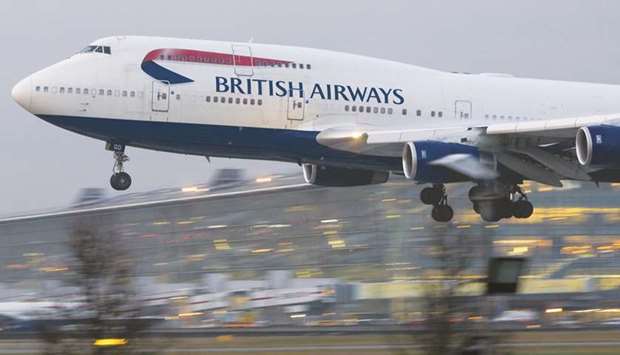British Airways yesterday retired all its Boeing 747 jumbo jets, hastening the withdrawal of its ageing aircraft after the coronavirus pandemic crushed demand for air travel and carriers started switching to greener jets.
BA parent group IAG, which had been due to phase out the iconic planes by 2024 in a process already begun, said the entire fleet was being retired with immediate effect owing to “the downturn in travel caused by the Covid-19 global pandemic”.
A statement added: “As we head into the future we will be operating more flights on modern, fuel-efficient aircraft such as our new (Airbus) A350s and (Boeing) 787s, to help us achieve net-zero carbon emissions by 2050.”
BA has 31 Boeing jumbos, more than any other airline, while the dwindling number of carriers continuing to fly the 747 include Air India, Korean Air and Lufthansa.
In Australia, Qantas yesterday carried out a farewell flight for its last remaining 747.
US titan Boeing launched the 747 in 1970, with the 400-seater jet dominating international air travel and cargo over the following decades. “It’s the end of an era for the queen of the skies,” independent aviation analyst John Strickland told AFP yesterday.
Production of the A380 superjumbo meanwhile ceases next year — a decision taken by European plane maker Airbus before the pandemic.
“The virus certainly expedited” BA’s retirement of the 747, Strickland said, noting that the British airline had already decommissioned almost half of its fleet that once stood at 57 aircraft.
But Covid-19 hastened BA’s latest move, with the virus battering the air transport sector and decimating demand, sparking bailouts and tens of thousands of job cuts at airlines.
“The global air market is in tatters, not least the US market,” said Strickland. Covid-19 has killed nearly 600,000, according to an AFP tally.
The United States is the worst-hit country with 138,360 deaths.
British Airways is meanwhile shedding 12,000 staff, while Boeing has confirmed 16,000 layoffs.
American Airlines has announced 45,000 job losses and German carrier Lufthansa — which received a €9bn state bailout — has removed 22,000 posts.
The pandemic, meanwhile, is pushing the aviation sector to more quickly embrace modern fuel-efficient aircraft which are helping carriers to save precious cash and survive, according to London-based aviation analyst Alex Macheras. “Airlines concluded just weeks into the pandemic that larger and inefficient aircraft would hinder any efforts to break even,” Macheras told AFP yesterday.
He added that older aircraft had “too many empty seats to fill and too much fuel required, or in some cases like the 747 — both”. Macheras added: “Newer, lighter, smaller, and more economically and environmentally efficient aircraft such as the Airbus A350 are key to airlines adapting to fit the ‘new normal’ — and we are seeing these replacement decisions taking place at airlines around the world.”

A Boeing 747 passenger aircraft, operated by British Airways, lands at London Heathrow Airport in London. BA parent group IAG, which had been due to phase out the iconic planes by 2024 in a process already begun, said the entire fleet of Boeing 747s was being retired with immediate effect owing to u201cthe downturn in travel caused by the Covid-19 global pandemicu201d.
